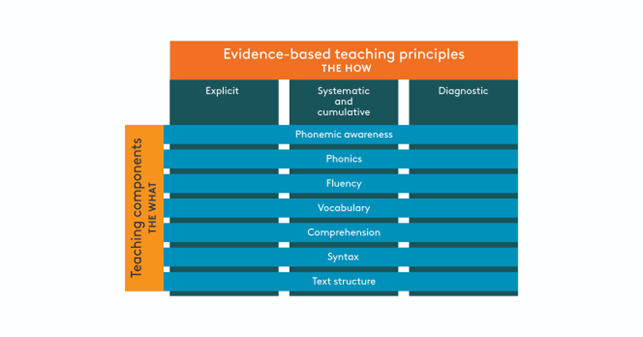Unlocking literacy success: the power of a structured approach
By Kaye Brunton on October 1, 2025 in Curriculum
This blog unpacks why a structured literacy approach - explicit, systematic, and evidence-based - can make all the difference for ākonga, especially those needing extra support.
Ensuring that every learner develops the skills and knowledge to read and write effectively is at the heart of quality teaching. A structured literacy approach offers a powerful, evidence-based way to build strong foundations, making literacy learning accessible for all ākonga, especially those who need extra support.
Why take a structured literacy approach?
Understanding how students learn to read and write is key to effective teaching. Research in the science of learning shows that literacy acquisition requires more than exposure - it needs deliberate, structured instruction.
A structured literacy approach ensures that literacy skills are taught explicitly, sequentially, and cumulatively. No student is left to ‘just pick it up’ on their own. This method provides clarity and consistency, ensuring every learner gets the support they need to succeed.
What is a structured literacy approach?
Structured literacy is not a one-size-fits-all programme or scripted reading intervention. It is an evidence-based teaching approach designed to meet the diverse needs of learners. It integrates all aspects of literacy — listening, speaking, reading, and writing — through systematic, explicit instruction that focuses on key elements, including:
phonology – understanding the sound system of language
orthography – recognising spelling patterns and word structures
morphology – understanding meaningful word parts
syntax– recognising sentence structure and word order
semantics – developing word and phrase meanings
text structure – comprehending how written language is organised.
By addressing these elements explicitly, structured literacy provides a clear and consistent pathway for learners to develop strong reading and writing skills.

Teaching principles: how we teach matters
Structured literacy is built on three core teaching principles that support all learners, particularly those who find literacy challenging:
explicit instruction – concepts are explained and modelled clearly, with targeted feedback to ensure understanding.
systematic and cumulative learning – skills are taught in a well-organised sequence, building on what has already been learned.
diagnostic teaching – ongoing assessment and monitoring allow teachers to respond to learners’ needs, enabling mastery and automaticity.
The key components: what we teach
A structured literacy approach ensures that essential skills are explicitly taught and practiced in a way that reduces cognitive load and supports deep learning. The key components include:
phonemic awareness – identifying and manipulating sounds in spoken words
phonics – understanding letter-sound relationships to read and spell
fluency – reading with speed, accuracy, and expression
vocabulary – understanding and applying words in context
comprehension – actively making meaning from text
syntax – recognising how sentences are formed
text structure – understanding how different types of texts are organised.
Using the “I do; we do; you do” model, teachers gradually release responsibility to students, supporting them to build confidence and independence.
The role of cognitive load in literacy learning
Cognitive load theory tells us that working memory has limited capacity. New information must be introduced in small, manageable steps. When too much information is presented at once, learning becomes difficult. A structured literacy approach helps prevent cognitive overload by breaking learning into clear, sequential steps and providing repeated opportunities for practice.
How we can support you
Gain clarity, confidence, and consistency in your literacy practice by partnering with expert facilitators who understand the power of a structured approach. Our team works alongside you to co-design tailored, evidence-based professional learning and development (PLD) that meets your needs — whether you're seeking one-on-one coaching, leadership team guidance, or a whole-school PLD programme.
We can help you:
unpack the components of structured literacy
use diagnostic tools for assessment and progress monitoring
build a coherent, structured programme with a clear scope and sequence.
Let’s work together to ensure every learner builds strong literacy foundations. Get in touch to explore how we can support your journey.
If you have any questions about this article
Other articles you might like
In this blog, Kaye explores how evidence can guide school leaders to reflect on the year, refine their priorities, and plan with clarity.
What effective PLD looks like for targeted and tailored structured literacy approaches teaching.
How curriculum-first design and evidence-informed practice are helping schools accelerate learning
